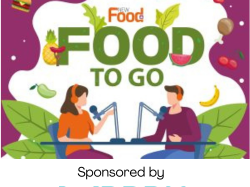Episode 48: Did COP28 deliver? Part Two with Sam Fulton
- Like
- Digg
- Del
- Tumblr
- VKontakte
- Buffer
- Love This
- Odnoklassniki
- Meneame
- Blogger
- Amazon
- Yahoo Mail
- Gmail
- AOL
- Newsvine
- HackerNews
- Evernote
- MySpace
- Mail.ru
- Viadeo
- Line
- Comments
- Yummly
- SMS
- Viber
- Telegram
- Subscribe
- Skype
- Facebook Messenger
- Kakao
- LiveJournal
- Yammer
- Edgar
- Fintel
- Mix
- Instapaper
- Copy Link
Posted: 9 February 2024 | New Food | No comments yet
Food to Go returns with more analysis of COP28 and its true impact on the food and beverage industry.
This episode of Food to Go is brought to you by Merck Life Science. To learn more about how Merck can help you maintain high standards of safety and quality, visit https://www.sigmaaldrich.com/GB/en/foodtestinghero.
Josh and Grace return with more analysis of COP28 with Sam Fulton, Group Director Corporate Affairs & Sustainability at Nomad Foods, to find out whether the food and beverage industry really feel that this year’s climate conference delivered for them.
Sam talks about COPs gone by and the missed opportunities to make meaningful change to the food and beverage system, however she also discusses the positive outcomes of COP 28, such as the Declaration on Sustainable Agriculture Resilience and Systems and Climate Action, signed by over 150 countries.
Find out the reason why Fulton is more optimistic about COP than she was at Food Integrity Global 2023, and where she thinks the COP conferences need to improve if they are to have a real impact on the food and beverage sector.
You can find a small part of the episode transcribed below – listen above for the full ep!
Grace Galler (GG): I want to cast our minds back to food integrity global late last year on stage, you discussed whether the conference was a platform for tangible change or more of a talking shop. Can you explain to Food to Go listeners why you feel that COP21 was quite a big turning point for the food industry?
Sam Fulton (SF): So COP21, which took place a long time ago in 2015, was really historical. It was a universal agreement and actually it had really strong objectives and commitments attached to it. Really, the aim was to limit global warming to 1.5 degrees compared to pre-industrial levels and that really is to help us to avoid the most damaging impacts of climate change.
So the actual commitment was historical and transformational. Since then, the science has continued to get stronger as we’ve seen through the frequent IPCC reports, but while the commitments are great, actually one of the challenges is that we now need action plans against them and the action plans and timelines in some areas are actually still quite vague. So if you look at COP 28, the fact that countries actually agreed to transition away from fossil fuels and what they described as a just orderly and equitable manner is really great, but even that doesn’t really compel them to take action or specify timeline. So COP21 was definitely a turning point, but even in the years since we’ve still not really managed to get to the point where we’ve got commitments and action plans that match the necessity for change.
GG: I know you’ve previously spoken about COP having an increasing influence on the sector probably because of the momentum of the discussions that are being had. What do you think is driving this progressive change? Is it there being more information out in the world about how important food is when it comes to climate change?
SF: I think COP21 set an agenda for everybody and then it was really around COP23 that food and agriculture started to make it onto the agenda. There were some issues surrounding climate and food production discussed at COP23 and then as I said since then the process really has started to become quite a narrow focus on agricultural production.
So I think what the industry has started to do is look at the fact that we need to all work together to create an operating environment that’s more stable. We all want to develop more sustainable business models in the food industry models that are more resilient for the future. So actually almost irrespective of legislation, companies are starting to change anyway because they don’t want to be carrying increased risk for the future. We also don’t want to be missing opportunities to develop much more efficient business models and ultimately we clearly need governments to have strong policies and legislation in place to support that. But I think actually the f&b industry has really stepped up to progress and really move ahead irrespective of actually what’s happening on some of the political agendas, which is really positive and I think actually bodes well for the future.
Listen to the episode above to hear more from Sam
Related topics
Food Security, Food Waste, Health & Nutrition, Supply chain, Sustainability
Related organisations
Related regions
Africa, Asia Pacific & Oceania, Central and South America, Central and South Asia, Europe, Middle East, North America, UK & Ireland







